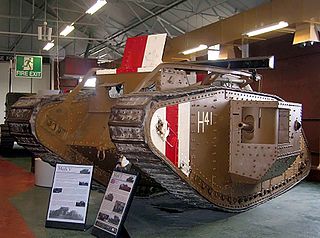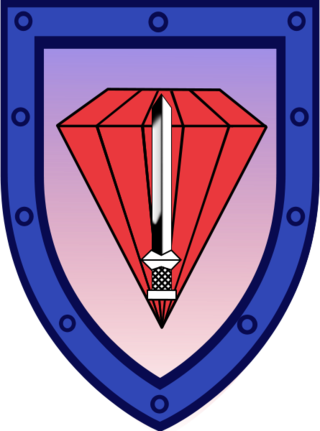Gallery
- A Goliath remote-piloted demolition charge being used in Russia in 1944
- An IDF D9 demolishing a house in the Gaza Strip during the Second Intifada
- A Volvo EC480EHR high reach demolition machine
A demolition vehicle is a vehicle used to demolish buildings and other structures.
Military forces require such vehicles to clear obstacles, fortifications and rubble so that they can safely advance. Military engineers may use a variety of specialised vehicles including armoured bulldozers and explosive robotic drones. [1]
The first being the prototypes of explosive robotic drones of Aubriot-Gabet 'land torpedoes' invented in France in 1915 [2] and the Crocodile Schneider-Creusot, 20 examples were put into service with the 2nd French Army in July 1915. [3]
Examples used during the Second World War include the German Goliath, the AVRE variant of the Churchill tank and the Centaur bulldozer. The Israel Defence Forces developed armoured bulldozers such as the IDF Caterpillar D9 in the 1950s and has used these with success in several of its conflicts.
Specialist demolition vehicles may be used by civilian contractors. Volvo produce a range of tracked vehicles equipped with lengthy hydraulic arms and a variety of attachments including drills, grabs, pincers and scoops. [4]

An armoured fighting vehicle or armored fighting vehicle (AFV) is an armed combat vehicle protected by armour, generally combining operational mobility with offensive and defensive capabilities. AFVs can be wheeled or tracked. Examples of AFVs are tanks, armoured cars, assault guns, self-propelled artilleries, infantry fighting vehicles (IFV), and armoured personnel carriers (APC).

A military engineering vehicle is a vehicle built for construction work or for the transportation of combat engineers on the battlefield. These vehicles may be modified civilian equipment or purpose-built military vehicles. The first appearance of such vehicles coincided with the appearance of the first tanks, these vehicles were modified Mark V tanks for bridging and mine clearance. Modern military engineering vehicles are expected to fulfill numerous roles such as; bulldozer, crane, grader, excavator, dump truck, breaching vehicle, bridging vehicle, military ferry, amphibious crossing vehicle, and combat engineer section carrier.

A high-explosive squash head (HESH), in British terminology, or a high-explosive plastic/plasticized (HEP), in American terminology, is a type of explosive projectile with plastic explosive that conforms to the surface of a target before detonating, which improves the transfer of explosive energy to the target. Squash head projectiles are similar to high-explosive projectiles and are well suited to many of the same targets. However, while HESH projectiles are not armour-piercing, they can defeat armored targets by causing spall, which can injure or kill a vehicle's occupants or detonate some types of ammunition.

A combat engineer is a type of soldier who performs military engineering tasks in support of land forces combat operations. Combat engineers perform a variety of military engineering, tunnel and mine warfare tasks, as well as construction and demolition duties in and out of combat zones.

The Caterpillar D9 is a large track-type tractor designed and manufactured by Caterpillar Inc. It is usually sold as a bulldozer equipped with a detachable large blade and a rear ripper attachment.

A bulldozer or dozer is a large, motorized machine equipped with a metal blade to the front for pushing material: soil, sand, snow, rubble, or rock during construction work. It travels most commonly on continuous tracks, though specialized models riding on large off-road tires are also produced. Its most popular accessory is a ripper, a large hook-like device mounted singly or in multiples in the rear to loosen dense materials.

Urban warfare is warfare in urban areas such as towns and cities. Urban combat differs from combat in the open at both operational and the tactical levels. Complicating factors in urban warfare include the presence of civilians and the complexity of the urban terrain. Urban combat operations may be conducted to capitalize on strategic or tactical advantages associated with the possession or the control of a particular urban area or to deny these advantages to the enemy. It is considered to be arguably the most difficult form of warfare.

In 2004, the Israel Defense Forces (IDF) launched Operation Rainbow in Cloud in the southern Gaza Strip on 12–24 May 2004, involving an invasion and siege of Rafah. The operation was started after the deaths of eleven Israeli soldiers in two Palestinian attacks, in which M113 armored vehicles were attacked.

The IDF Caterpillar D9 — nicknamed Doobi — is a Caterpillar D9 armored bulldozer used by the Israel Defense Forces (IDF). It is supplied by Caterpillar Inc. and modified by the Israel Defense Forces, Israeli Military Industries and Israel Aerospace Industries to increase the survivability of the bulldozer in hostile environments and enable it to withstand attack.

Yahalom is a sayeret unit of the Israeli Combat Engineering Corps of the Israel Defense Forces (IDF).

The Israeli Combat Engineering Corps is part of the Israel Defense Forces with responsibility for mobility assurance, road breaching, defense and fortifications, counter-mobility of enemy forces, construction and destruction under fire, sabotage, explosives, bomb disposal, counter-weapons of mass destruction (NBC) and special engineering missions.

Hobart's Funnies is the nickname given to a number of specialist armoured fighting vehicles derived from tanks operated during the Second World War by units of the 79th Armoured Division of the British Army or by specialists from the Royal Engineers.

The 79th Armoured Division was a specialist armoured division of the British Army created during the Second World War. The division was created as part of the preparations for the Normandy invasion on 6 June 1944, D-Day.

An unmanned ground vehicle (UGV) is a vehicle that operates while in contact with the ground without an onboard human presence. UGVs can be used for many applications where it is inconvenient, dangerous, expensive, or impossible to use an onboard human operator. Typically, the vehicle has sensors to observe the environment, and autonomously controls its behavior or uses a remote human operator to control the vehicle via teleoperation.

The armoured bulldozer is a basic tool of combat engineering. These combat engineering vehicles combine the earth moving capabilities of the bulldozer with armour which protects the vehicle and its operator in or near combat. Most are civilian bulldozers modified by addition of vehicle armour/military equipment, but some are tanks stripped of armament and fitted with a dozer blade. Some tanks have bulldozer blades while retaining their armament, but this does not make them armoured bulldozers as such, because combat remains the primary role—earth moving is a secondary task.

The Goliath tracked mine was a series of two unmanned ground vehicles used by the German Army as disposable demolition vehicles during World War II. These were the electrically powered Sd.Kfz. 302 and the petrol-engine powered Sd.Kfz. 303a and 303b. They were known as "beetle tanks" by the Allies.

The Mittlerer Ladungsträger Springer was a demolition vehicle of the German Wehrmacht in World War II.

Armoured Vehicle Royal Engineers (AVRE), also known as Assault Vehicle Royal Engineers, is the title given to a series of armoured military engineering vehicles operated by the Royal Engineers (RE) for the purpose of protecting engineers during frontline battlefield operations.
IMI Systems, previously Israel Military Industries, also referred to as Ta'as, was an Israeli weapons manufacturer. The company manufactured weapons, munitions and military technology mainly for the Israeli security forces.